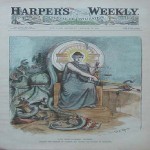 The Supreme Court decision in Citizens United v. FEC strikes down as unconstitutional a federal law that prohibits corporations and unions from using general treasury funds to make independent expenditures that expressly advocate the election or defeat of candidates for office. The majority opinion, written by Justice Kennedy, ignores hundreds of years of Supreme Court history in interpreting the subjects of federalism, free markets, and free speech. In its place, Justice Kennedy presents a textualist interpretation of the First Amendment that is divorced from any history or context. Justice Kennedy engages in the sort of “faux originalism” (syn. “fake,” “artificial,” “false”) that has been criticized by Judge Richard Posner. Kennedy places a historical glaze on his own personal values and policy preferences, and calls the result the “original understanding” of the First Amendment.
The Supreme Court decision in Citizens United v. FEC strikes down as unconstitutional a federal law that prohibits corporations and unions from using general treasury funds to make independent expenditures that expressly advocate the election or defeat of candidates for office. The majority opinion, written by Justice Kennedy, ignores hundreds of years of Supreme Court history in interpreting the subjects of federalism, free markets, and free speech. In its place, Justice Kennedy presents a textualist interpretation of the First Amendment that is divorced from any history or context. Justice Kennedy engages in the sort of “faux originalism” (syn. “fake,” “artificial,” “false”) that has been criticized by Judge Richard Posner. Kennedy places a historical glaze on his own personal values and policy preferences, and calls the result the “original understanding” of the First Amendment.
As such, Citizens United v. FEC stands with District of Columbia v. Heller, the Second Amendment case decided in 2008, as an example of the Justices slapping the “originalist” label on a profoundly un-originalist interpretation of the Bill of Rights. It is appropriate to view the two cases together. Both are exercises in raw political power employed in order to accomplish conservative objectives. Both ignore hundreds of years of understanding about the meaning of the relevant constitutional provisions, in favor of a meaning derived by taking the words of the Amendment out of context. And both embrace interpretations of the constitutional Amendment at issue that are inconsistent with the meaning ascribed to that same language by the intellectual father of originalism, Robert Bork. In the same way that modern scholars deride the “Lochner era” as a misguided period in American Constitutional Law, I believe that future scholars and judges will recognize and reject the intellectual dishonesty of the “Heller era.”

 The Supreme Court decision in
The Supreme Court decision in